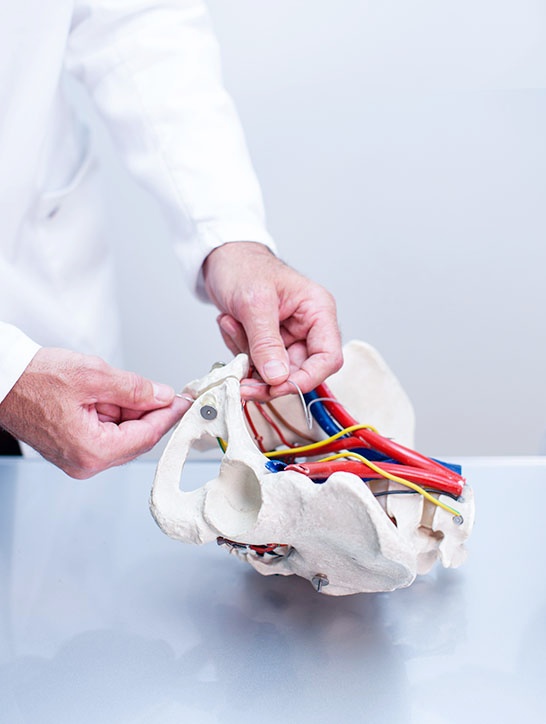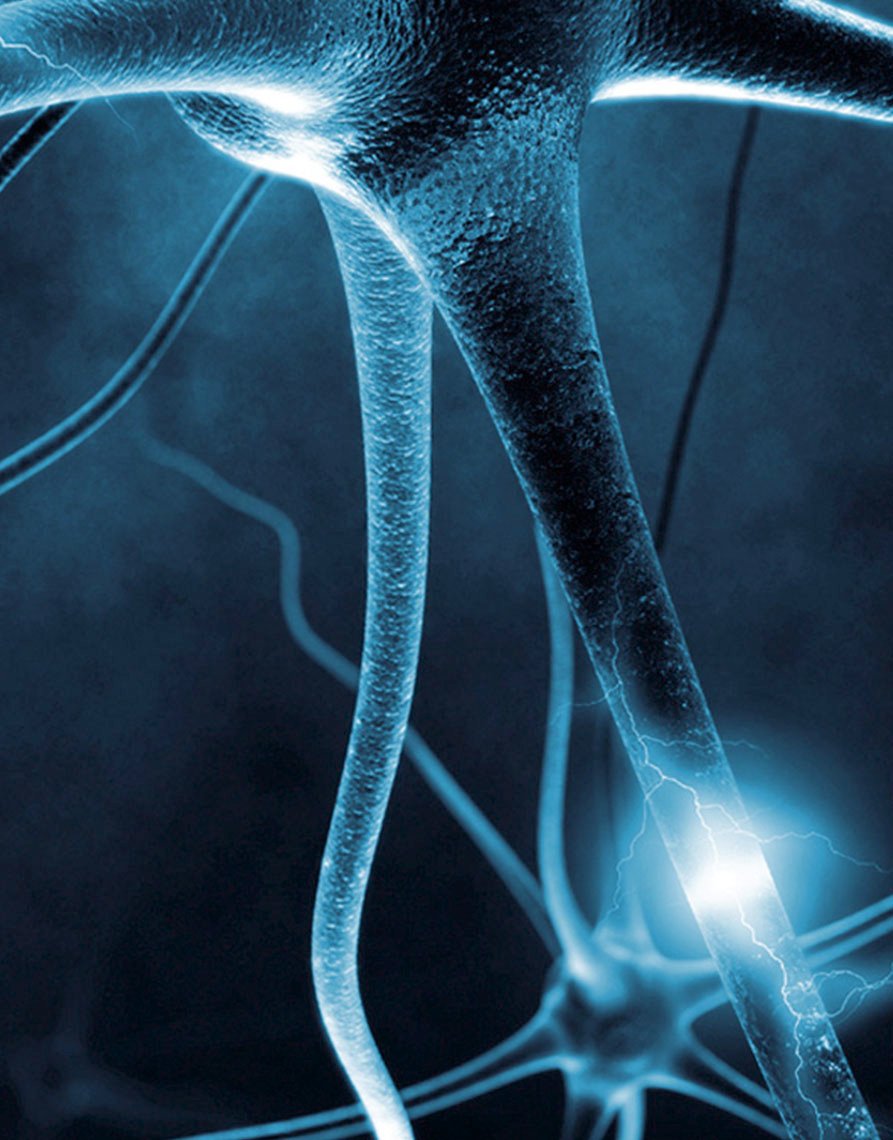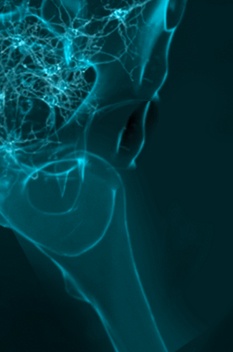Introduction
Peripheral nerve tumors can occur anywhere in the body. Most of them aren't cancerous ...
Every one of us gets to know pain during the course of our lifetime. If this unpleasant sensory perception disappears again in time, we can usually live with it well. But when pain becomes a constant companion, it has a strong influence on the everyday life of the person affected. Chronic pain is not only a physical strain, it also burdens the soul. The so-called neuropathic pain (nerve pain or neuropathy), which is perceived as a permanently burning pain, is particularly agonizing, sometimes also felt as tingling or stinging, which is associated with burning. We understand what a life of constant pain is like.
When we feel pain, our nerve cells usually only transmit pain information to the brain. However, in neuropathic pain - also known as nerve pain, neuralgia or neuropathy - the nerves themselves are responsible for the development of the pain. The cause is usually damage or irritation of the affected nerves, as long as this acts on the nerve fibres and nerve tracts, the pain persists, often for long periods afterwards too because the brain has stored the pain as a sensory program. Neuropathic pain quickly becomes chronic. Typical signs are unbearable "burning pain" or "electrical pain", sudden pain attacks that are perceived as shooting pain, and hypersensitivity to touch.




Neuropathic pain caused by damage to the pelvic nerves can appear in the back part of the thigh (dorsally) with radiation extending all the way to the foot, in the region around the anus and sphincter muscle (perianal region), in the genital region, the buttocks, the lower back or the inside or outside of the thighs.
The treatment must always be individually adapted to the patient. The correct diagnosis is of de crucial importance for the success of the treatment. In the therapy of chronic nerve pain, Prof. Possover follows the neuropelveological approach, which focuses on the treatment of nerve pain caused by damage to the pelvic nerves.
Burning pain in the most sensitive part of the body
Pudendal neuralgia ("Alkock's canal syndrome") is characterized by chronic pain that is perceived as burning. In women, they range from the pubic area and clitoris to the perineum and anal region. The cause is usually compression of the pudendal nerve in the pudendal or Alcock canal. Women who have suffered a birth trauma are often affected, even 20 to 30 years after a vaginal birth.
Men can also be affected by pudendal neuralgia. The pain extends from the penis and testicles to the anal region. Since the pudendal nerve is also of particular importance for the bladder and intestines as well as for the genitals and sexual functions, nerve damage can also lead to irritable bladder, urinary or faecal incontinence and sexual dysfunction (erectile dysfunction).
Nerve pain after mesh treatments
Mesh implants in the pelvis carry the risk of nerve injury - especially of the pudendal nerve and the so-called sacral roots. This can result in burning pain, sensory irritation or dysfunction, which can occur immediately after the operation or with a delay of several days. A nerve compression caused by scar tissue (fibrotic entrapment) or a nerve compression caused by constriction due to enlarged blood vessels in the pelvis (vascular entrapment) develops over several months or even years.

Since Pudendal Neuralgia is based on a kind of bruising of the pudendal nerve, surgical nerve decompression is the most effective treatment method. The procedure is performed using a laparoscopic decompression procedure: tiny cameras make the fine sensitive nerve structures visible and allow for a gentle operation. The majority of patients are pain-free after a few short months.
If the pudendal nerve is not only compressed but also injured, pudendal neuromodulation is the therapy of choice. In a minimally invasive procedure, a microstimulator system a few centimetres in size is placed on the pudendal nerve by laparoscopy (LION procedure). The electrical stimulation is controlled by the patient with a remote control and leads to a relaxation of the nerve.

If the mesh has damaged the pelvic nerves, the injured nerve must first be precisely pinpointed. A laparoscopic examination of the affected area can then be carried out. This enables an exact diagnosis of the cause. In the same treatment step, decompression must be accomplished by exposing the nerves. The aim of the intervention is not the removal of the mesh, but the complete liberation of the nerve, for which a systematic exploration of the damaged nerves by laparoscopy is necessary.
In the case of severe injury or destruction of the nerve, the implantation of electrodes for neuromodulation can help, but it is used in less than 5% of patients.

Professor Marc Possover is one of the most incredible, rare professional, intellectual doctors whom i ever met.
I was lucky to be present at a difficult surgical oncological operation of one of my patients.
Dear Dr. Possover. We would like to thank you very much for the operation you performed in November 2014. Thanks to your excellent work we have become parents of two sons. Our family will always be grateful to you. Best regards.
For more than 4 years I suffered from a tearing pain in the pelvic floor and a strong irritable bladder. Oestopathy, urologists, acupuncture and a neurologist who wanted to send me to a rheumatologist could not help.
My name is Mrs. Liat Nadel, 51 years old, married and live in Israel. I was only 12 when my Endometriosis knocked on my door/life, but was actually diagnosed only 11 years later by mistake, "thanks" to an emergency surgery.
From the moment I walked into the consultation room and the Professor's initial response to my complaint I felt overwhelmingly at ease. For a healthcare professional to finally know exactly what your problem was but more importantly telling me he could fix the problem was like winning the lottery and he certainly delivered on his promise.
To help people in difficult situations to improve their quality of life has become his life's passion. Continuous research, decades of clinical experience and the focused determination to find a solution for previously unsolved medical problems, have enabled Prof. Possover to help often quite discouraged patients find release from their seemingly insurmountable problems.
Our team will take care of you

Neuropelveology is a medical discipline developed by Prof. Possover. It is based on the discovery of the pelvic nerves and includes the diagnosis of the diseases of these nerves by means of gynaecological examination methods and their treatment by means of laparoscopy.
Read moreWe will dedicate our expertise and know-how to help you find the solution that is right for you.
„As a cheerful, open and communicative person, I really appreciate coming into contact with people from all over the world. The well-being of others is very important to me.“
Peripheral nerve tumors can occur anywhere in the body. Most of them aren't cancerous ...
Vulvodynia is a chronic pain syndrome affecting respectively the vulva and occurs ...
Klausstrasse 4
CH - 8008 Zürich
Switzerland
E-Mail: mail@possover.com
Tel.: +41 44 520 36 00